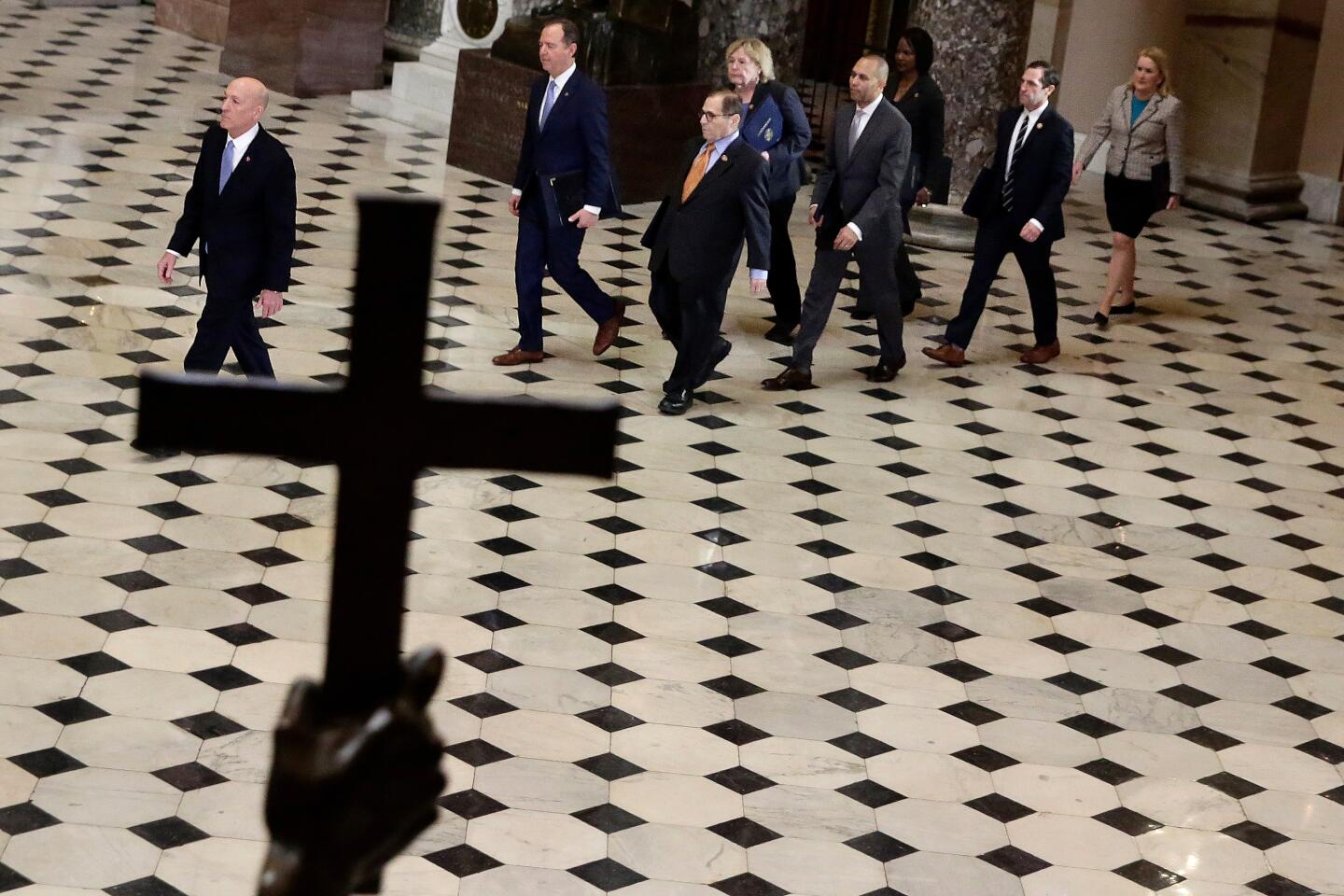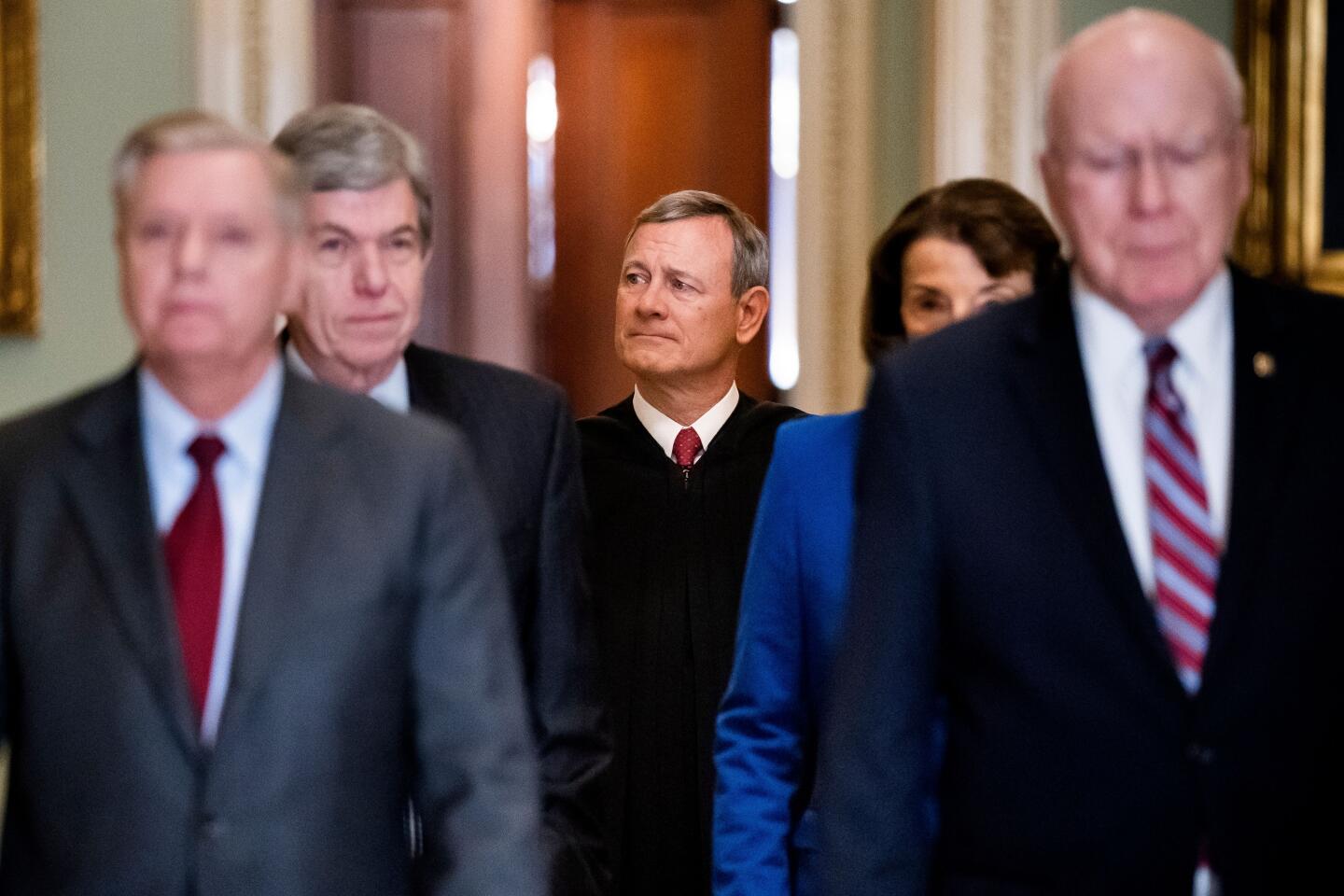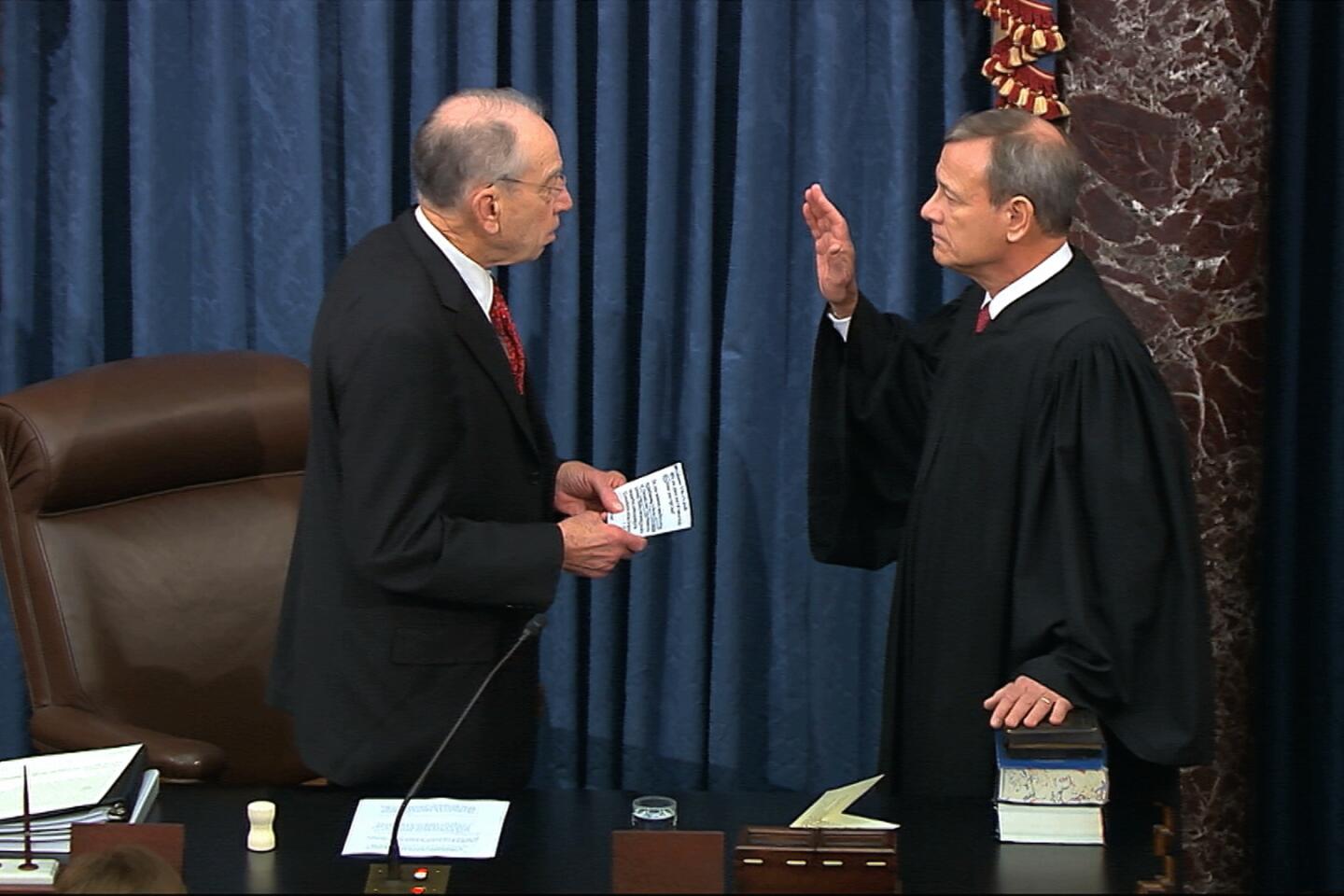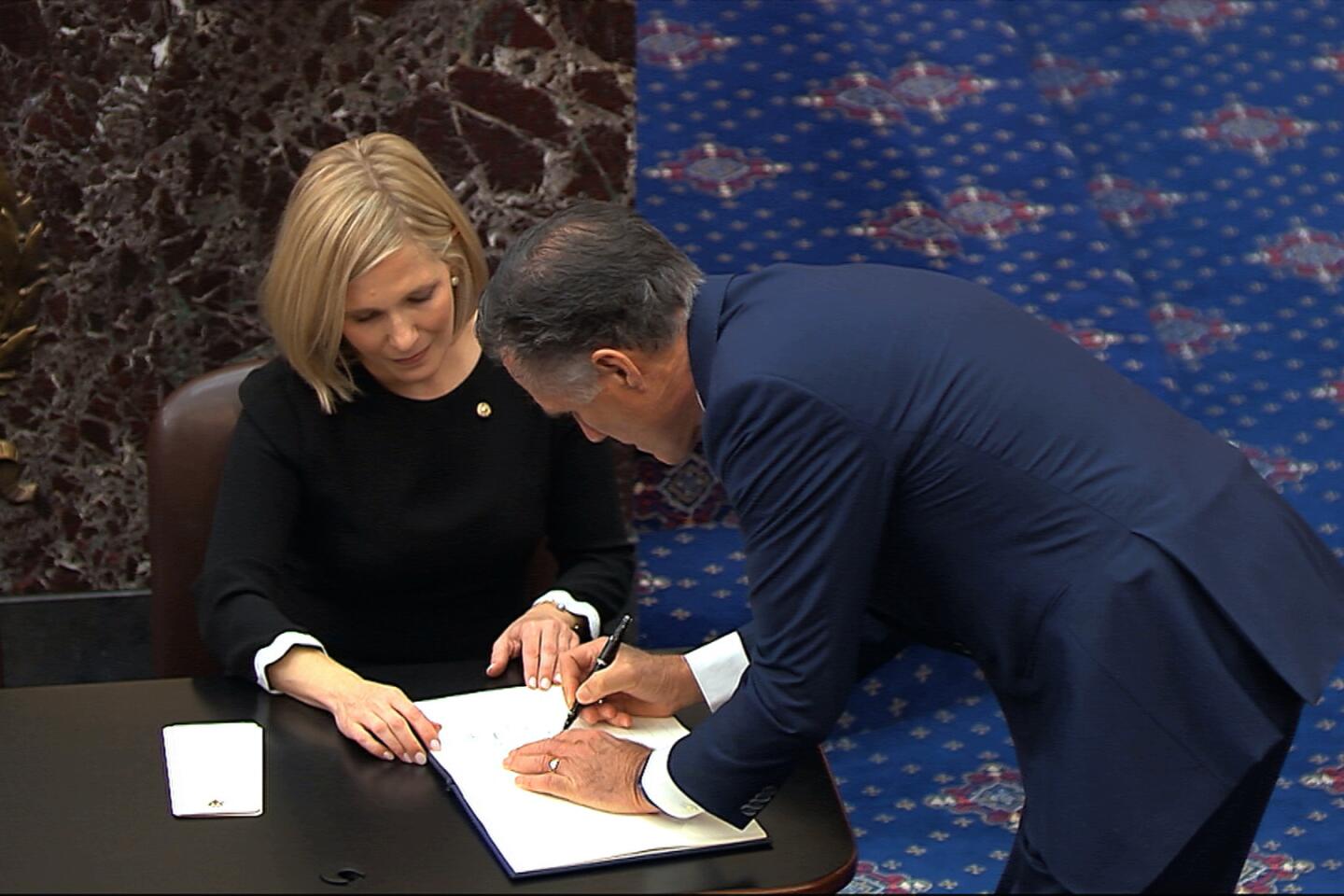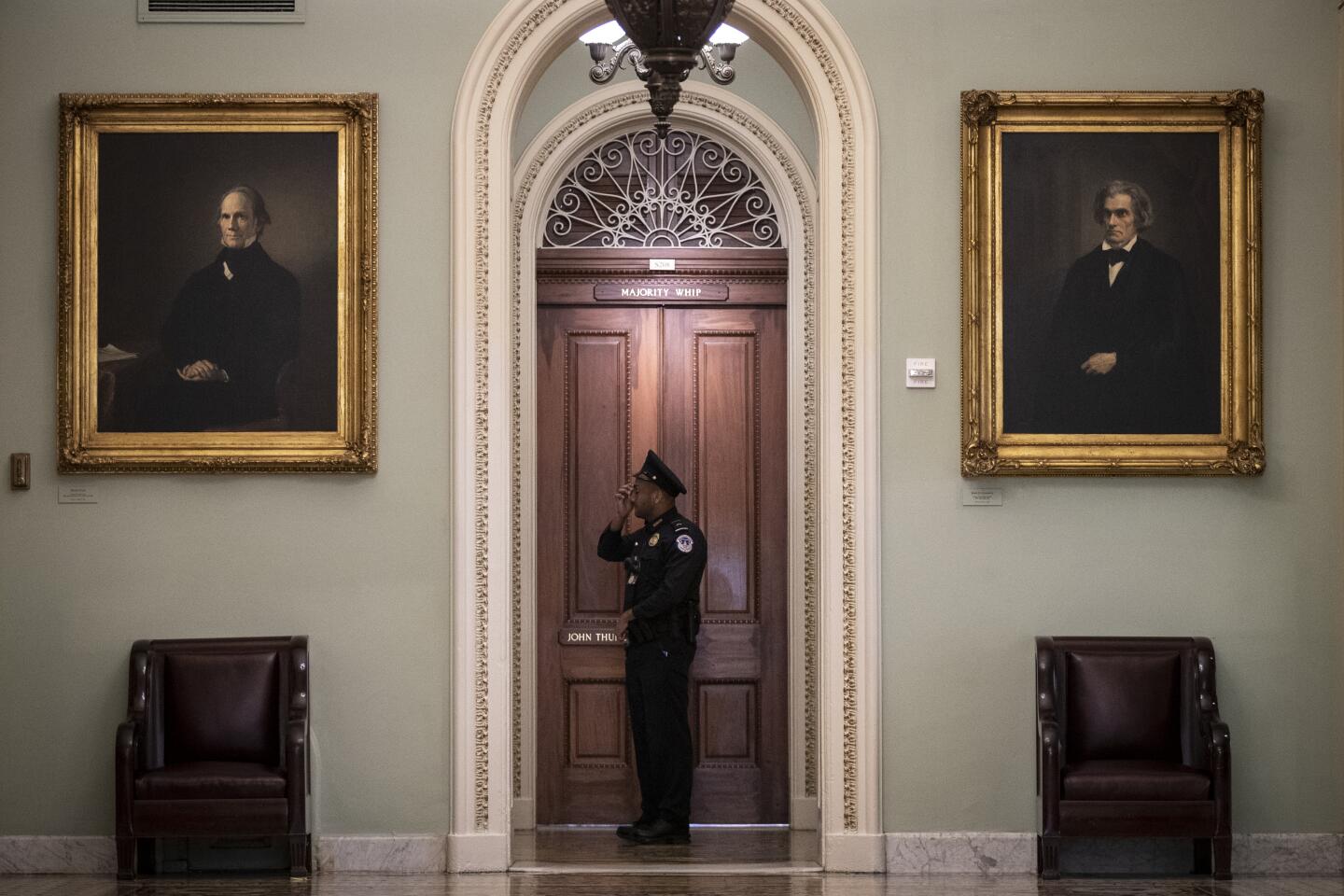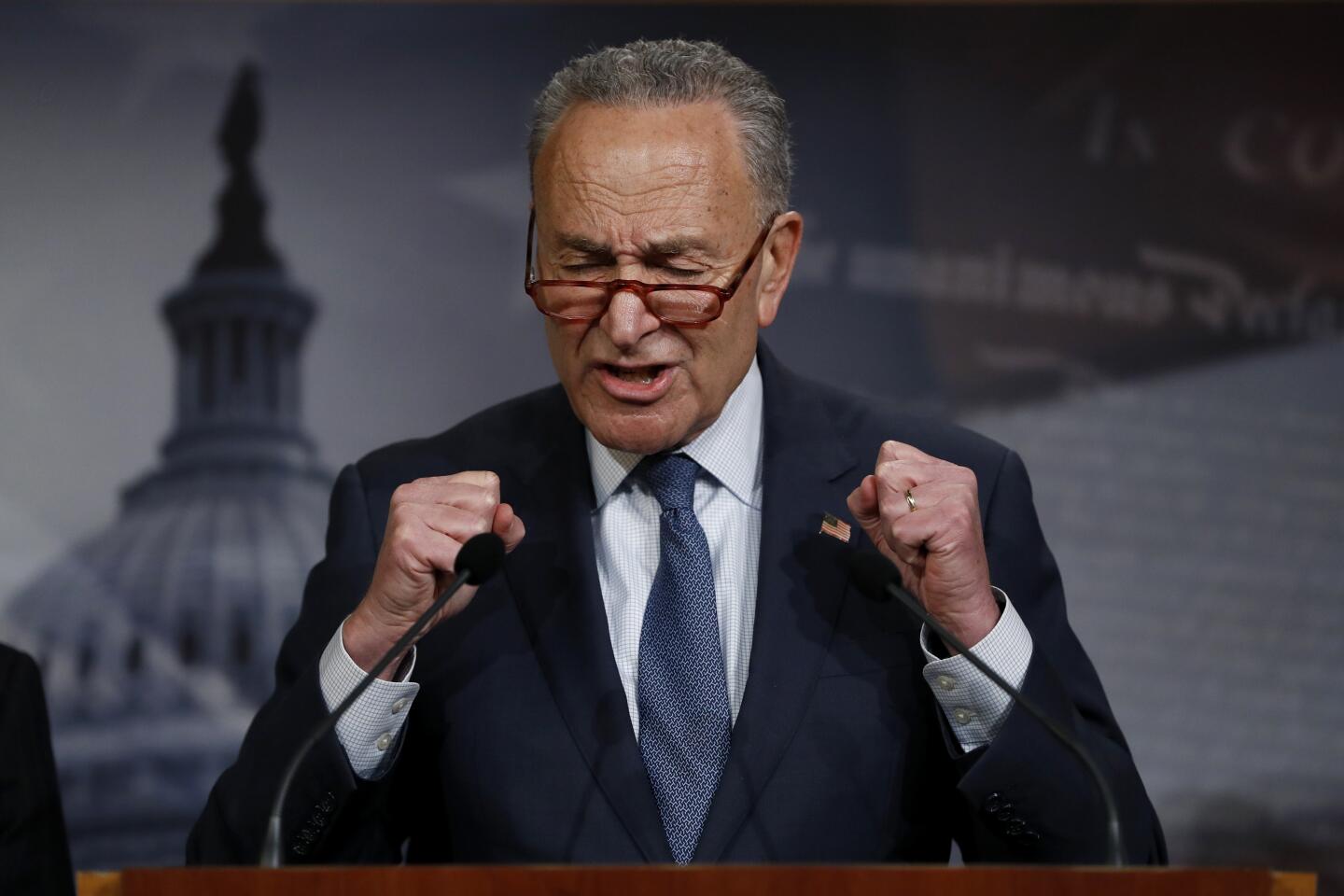Chief justice, senators sworn in as Senate begins historic impeachment trial of Trump
- Share via
WASHINGTON — For only the third time in American history, the Senate on Thursday began considering articles of impeachment to determine whether the president should be removed from office.
Despite the partisan nature of the House’s inquiry last month and a simmering debate over whether the Senate should subpoena witnesses in the trial, the sense of history and gravity struck lawmakers of both parties as the trial began with a choreographed ceremony. Supreme Court Chief Justice John G. Roberts Jr. was sworn in to preside, and he in turn asked lawmakers to take an oath to deliver “impartial justice.”
“When the chief justice walked in, you could feel the weight of the moment,” said Senate Minority Leader Charles E. Schumer (D-N.Y.). “The eyes of history, you felt it, are upon you.”
President Trump was impeached by the House in December for asking Ukraine to investigate former Vice President Joe Biden, his potential 2020 political rival, as he withheld nearly $400 million in U.S. aid from the country.
A nonpartisan government watchdog agency concluded Thursday that the administration violated federal law by withholding the congressionally approved money. The law “does not permit the president to substitute his own policy priorities for those that Congress has enacted into law,” the Government Accountability Office said.
Sen. Chris Van Hollen (D-Md.) called the report a “bombshell legal opinion” that “demonstrates, without a doubt, that the Trump administration illegally withheld security assistance from Ukraine.”
Republicans stressed that the GAO report said the administration’s Office of Management and Budget, not the president, broke the law. The office, known as OMB, is within the executive office of the president. “I think we’re going to hear some more about it,” said Sen. John Cornyn (R-Texas), “but I don’t think that changes anything.”
Also Thursday, Ukraine announced it was investigating some of the activities of Trump loyalists working there with Rudolph W. Giuliani, the president’s personal attorney.
Trump on Thursday again dismissed the impeachment proceeding as a Democratic “hoax” and predicted the trial “should go very quickly.” Sixty-seven votes are required to convict and remove him from office, and none of the 53 Senate Republicans has indicated publicly that they’re apt to do so.
The trial will begin in earnest Tuesday when lawmakers debate a resolution to set the rules over how to proceed, including the divisive question of whether to make an upfront commitment to hear from witnesses, or to delay that decision until after arguments.
Republicans say they have the votes required to pass rules over Democratic objections. The GOP rules would punt a decision on witnesses until after the trial has started. Senate Majority Leader Mitch McConnell (R-Ky.) says it would be similar to the process used in President Clinton’s 1999 trial. But that measure had bipartisan support, and this one does not.
Democrats plan to contest the GOP rules and force votes on subpoenaing several Trump administration officials who refused to cooperate with the House’s impeachment inquiry. One, former National Security Advisor John Bolton, has since volunteered to testify in the Senate trial.
Sen. Susan Collins (R-Maine), who is part of a small group of Republicans who have expressed openness to witnesses, said Thursday she is “likely” to support a motion to subpoena witnesses after initial arguments are heard, “just as I did in 1999.” She said she had not made any decisions about what witnesses she would like to hear from.
During Thursday’s relatively short Senate session, 99 senators — Sen. James Inhofe (R-Okla.) was away for family reasons — sat quietly at their desks as Rep. Adam B. Schiff (D-Burbank) read the articles aloud to the Senate. Schiff and six other House Democrats will act as de facto prosecutors.
“We’re participating in something that hasn’t happened very often,” said Sen. Mike Braun (R-Ind.), recalling the 1999 Clinton impeachment trial. “I think many senators have on their mind: Is this the new dynamic? Having two impeachments within 20 years of one another. I don’t think anybody likes that feeling.”
The proceedings got underway amid dramatically heightened security on Capitol Hill. Reporters who can normally roam much of the Capitol to speak with senators were kept behind rope barriers, changes imposed by the Senate sergeant-at-arms and Senate Republican leadership that will make it much easier for lawmakers to escape being questioned by the media.
A coalition of groups that advocate for press freedom and government transparency sent a letter to McConnell criticizing the changes. The rules “will impair [the media’s] ability to report on the impeachment trial proceedings, which are of abiding interest to Americans from across the political spectrum,” said the letter, sent by the Reporters Committee for Freedom of the Press and 57 other signatories.
Sen. Bernie Sanders (I-Vt.), one of four 2020 presidential hopefuls, admitted he would much rather be in Iowa, New Hampshire or another early Democratic primary states, but acknowledged his constitutional responsibility.
While the trial is underway, the Senate is required to meet each day — Monday through Saturday — at 1 p.m. Eastern to hear the case. Senate rules forbid senators from speaking in the chamber. Only the chief justice, majority leader and lawyers are allowed to do so.
Senators are also not supposed to bring reading materials unrelated to the trial or bring electronics into the chamber. Sen. Dianne Feinstein (D-Calif.) was spotted breaking the ban on cellphones Thursday. Several other senators whispered among themselves.
Debates among senators, such as the one expected Tuesday over the trial rules and whether to call witnesses, must be conducted in closed session. C-SPAN cameras will be shut off so the public will not be able to view the proceedings, although senators will be allowed to share what they heard in the session.
Democrats say a stream of new disclosures about Giuliani’s activities in Ukraine put added pressure on Republicans to allow witnesses.
Ukrainian police announced Thursday that they had opened an investigation into allegations that former U.S. ambassador to Ukraine Marie Yovanovitch came under illegal surveillance by Trump loyalists before she was recalled from her post last year.
The announcement followed the release by Democrats of documents showing Lev Parnas, an indicted associate of Giuliani, communicating about Yovanovitch’s movements. Parnas has said Trump and Giuliani were both aware of his activities, something Trump denied.
“I don’t know what he’s about,” Trump said at an event in the Oval Office Thursday about Parnas. “I don’t know where he comes from.”
Trump has appeared in several pictures with Parnas, but said he takes thousands of such pictures as a year at fundraisers and official events.
Trump also responded to a newly disclosed letter from Giuliani, in his capacity as “private counsel to President Donald J. Trump,” demanding to meet with Volodymyr Zelensky before his inauguration as president of Ukraine.
Trump said he “didn’t know about the specific letter, but if he wrote a letter, it wouldn’t have been a big deal.”
Ukraine also said it would look into reports that Russian hackers gained access to computers of the Ukrainian gas company Burisma, presumably in an effort to uncover embarrassing information about former Vice President Joe Biden, a possible Trump opponent in the November election. Biden’s son, Hunter, worked as a director for Burisma. Ukrainian officials say there is no evidence of wrongdoing by the Bidens.
House Speaker Nancy Pelosi (D-San Francisco) said new information from Parnas should be admitted to the Senate trial.
“Every day new incriminating information comes forward,” she said. “That only speaks very clearly to the need for the Senate to enter the documentation into their discussion.”
Parnas is under indictment in the Southern District of New York for unrelated matters, and his lawyer has suggested he wants immunity in that case, a factor Republicans have already brought up.
Cornyn said he didn’t know if Parnas was credible and it was up to the House managers whether to request to call him as a witness. “I don’t know, he looks kind of like a seamy, shady character to me,” he said.
More to Read
Get the L.A. Times Politics newsletter
Deeply reported insights into legislation, politics and policy from Sacramento, Washington and beyond. In your inbox three times per week.
You may occasionally receive promotional content from the Los Angeles Times.
